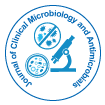

Case Report - (2021)Volume 5, Issue 2
The utilization of antimicrobials in food creatures makes a significant wellspring of antimicrobial-safe microscopic organisms that can spread to people through the food supply. Further developed administration of the utilization of antimicrobials in food creatures, especially decreasing the use of those that are "fundamentally significant" for human medication, is a significant stage toward saving the advantages of antimicrobials for individuals. The World Wellbeing Association has created and applied rules to rank antimicrobials as per their overall significance in human medication. Clinicians, administrative offices, strategy creators, and different partners can utilize this positioning when creating hazard the board methodologies for the utilization of antimicrobials in food creation creatures.
Antimicrobial Obstruction; Strategy creators; Campylobacter
Antimicrobials decline bleakness and mortality related with genuine and hazardous contaminations. Antimicrobial opposition diminishes the adequacy of these medications, expanding the danger of bleakness and mortality in genuine infections and, subsequently, compromising human wellbeing Antimicrobial opposition is an inescapable outcome of antimicrobial use. Neediness; imperfect control of the deal, quality, and utilization of antimicrobials; and helpless sewage and water frameworks are factors that add to the development and spread of antimicrobial obstruction. High paces of opposition have been accounted for, even in Escherichia coli, perhaps the most widely recognized reasons for bacterial disease in person Expanding levels of opposition convolute the determination of exact and authoritative antimicrobial treatment for genuine bacterial disease. A few creators have suggested expansive range specialists, for example, carbapenems, as experimental treatment, however the inadvertent blow-back to commensal and colonizing creatures is probably going to speed up the improvement of multidrug opposition through the determination furthermore, spread of microbes that produce metallo-b-lactamases [1].
Campylobacter and Salmonella
Campylobacter and non-typhoid Salmonella species spread from creatures to individuals through food and water, especially in created nations. At the point when antimicrobials are demonstrated for treatment of Salmonella disease (e.g., circulation system contaminations), clinicians regularly treat with fluoroquinolones and third-age cephalosporins. Be that as it may, these equivalent classes of antimicrobial specialists are likewise controlled to food creatures, which prompts the unavoidable improvement of safe microscopic organisms. An expanding commonness of Campylobacter that are safe to fluoroquinolones is related with the utilization of this class of drugs in food creatures. In nations where fluoroquinolones are prohibited or utilized sparingly in food creatures (e.g.,Sweden, Norway, and Australia), studies exhibit a low commonness of fluoroquinolone-safe Campylobacter, notwithstanding the utilization of fluoroquinolones in human medication for 120 a long time. In nations where fluoroquinolones are or alternately were regularly utilized in food creatures (e.g., Spain, China, and the Assembled States), higher paces of opposition are seen among disengages from both food creatures and people In these last mentioned nations, high opposition rates grew quickly, however did so solely after the presentation of fluoroquinolones in food creatures [2].
Staphylococcus Aureus
S. aureus causes diseases in numerous creatures, including poultry, pigs, and dairy cattle. In Europe, the US, and Canada, methicillinsafe S. aureus separates have spread from food creatures and buddy creatures to individuals. Despite the fact that it at present addresses a low extent of the all-out methicillin-safe S. aureus diseases that happen in individuals, there are an expanding number of reports of creature determined methicillin-safe S. aureus, particularly from pigs, causing local area beginning disease in individuals
Escherichia coli
Antimicrobial opposition in E. coli is an expanding issue especially in non-industrial nations (e.g., China and Mexico) where strains that cause blood stream contaminations are habitually multidrug safe. The principle repository for E. coli is the gastrointestinal parcel, where there is an enormous turnover of E. coli every day. Food is a significant vector for these living beings. Food creatures logical contribute a significant extent of the E. coli in the human gastrointestinal parcel, including drug-safe strains. Albeit most strains of E. coli are moderately have explicit, different investigations have shown that drug-safe strains of creature beginning (e.g., fluoroquinolone-safe E. coli from chickens) can either colonize or cause disease in people, Human contaminations with microorganisms that are safe to third-age cephalosporins, fluoroquinolones, or potentially aminoglycosides are currently boundless, and the quantity of such contaminations is quickly expanding in numerous nations [3].
Enterococcus
Enterococcus species, specifically Enterococcus faecium, are characteristically impervious to various antimicrobials, which limits treatment alternatives for contamination due to these microorganisms. The development of hereditary determinants that present protection from vancomycin can restrict treatment alternatives even further [4].
The WHO records are the main endeavor to foster a global agreement on the general significance of classes of antibacterial specialists to human medication to assist guide with gambling the board systems for utilization of comparative specialists in food creature creation and horticulture. Lessening the utilization of fundamentally significant antimicrobials in food creatures will diminish the measure of safe microorganisms that can create and spread. This will help relieve a danger to human wellbeing and decline bleakness and mortality in people, by safeguarding viable medicines for use in the instance of genuine illness brought about by these microorganisms. We ought to endeavor to decrease the utilization of antimicrobials all over (and subsequently lessen obstruction all over), including decrease of improper use in people for treatment of viral and contagious illnesses, as well with respect to treatment of sicknesses in which the advantage of antibacterials is indistinct (e.g., sinusitis and bronchitis). Nonetheless, these rundowns permit us to zero in at first on those specialists that are basically essential to human medication.
Citation: King D (2021) A Basic Advance for Creating Hazard the Board Techniques to Control Antimicrobial Obstruction from Food Production. J Clin Microbiol Antimicrob 5:111.
Received: 03-Aug-2021 Accepted: 17-Aug-2021 Published: 24-Aug-2021 , DOI: 10.35248/jcma.21.5.111
Copyright: © 2021 King D. This is an open-access article distributed under the terms of the Creative Commons Attribution License, which permits unrestricted use, distribution, and reproduction in any medium, provided the original author and source are credited.